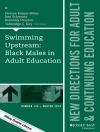Widen your view of adult education by learning how it is appliedby the nation’s largest adult education provider: themilitary.
Woven through this issue is the common thread of sound adulteducation practice. Addressing applications specific to themilitary but relevant to civilian providers, it highlight theimportance of developing the critical thinking and problem-solvingskills essential for military leaders in an increasingly complexworld. Chapters also address the intersection of higher educationand particular military populations, including civilian employees, active-duty personnel, veterans, and spouses. Finally, thesourcebook provides a glimpse into the future of both militaryeducation and adult education, highlighting the increasing bondbetween the two and their growing importance in the lifelongeducation of all Americans.
This is 136th volume of the Jossey-Bass quarterlyreport series New Directions for Adult and Continuing Education. Noted for its depth of coverage, it explores issuesof common interest to instructors, administrators, counselors, andpolicymakers in a broad range of settings, such as collegesand universities, extension programs, businesses, libraries, andmuseums.
Daftar Isi
EDITORS’ NOTES 1
Jeffrey Zacharakis, Cheryl J. Polson
1. Evolution and Influence of Military Adult Education 5
John M. Persyn, Cheryl J. Polson
This chapter reviews how adult education principles have beenintegrated into military education and describes militaryinitiatives that have contributed to adult education. Included is acomparison of implications for adult education identified in a 1947study with the tenets of the new Army Learning Concept for2015.
2. Beyond Training: New Ideas for Military Forces Operating Beyond War 17
Blaise Cornell-d’Echert Jr.
To meet future critical thinking and decision-making challengesfor military members of all ranks, this chapter advocates forcontinuing change in military education. Outcomes-based trainingand education is proposed as an appropriate avenue to meet thesechallenges.
3. Integrating Critical Thinking in the U.S. Army: Decision Support Red Teams 29
A. Steven Dietz, Eric A. Schroeder
Extending the discussion of the need for critical-thinkingskills by military planners, this chapter discusses the use ofnonmilitary Red Team members who serve as advisors to strategicplanning teams. As objective outsiders, the Red Team members canhelp planners to explore alternative perspectives that may uncoverpossible unintended consequences within proposed strategicplans.
4. Development of a Graduate Education Program for U.S. Army Interns and Careerists 41
Steven W. Schmidt, Vivian W. Mott
This chapter outlines a postsecondary program created formilitary civilian employees and explains the collaboration betweenadult education program developers and military leadership.
5. Impact of Cumulative Combat Stress on Learning in an Academic Environment 53
Kevin Peter Shea, Sarah Jane Fishback
Based on recently conducted research, this chapter discusses howbeing in an academic environment increased the levels of stress ofcombatveterans. The chapter identifies and discusses five areas ofconcern.
6. Understanding the Importance of Life Mission When Advising Soldiers 65
Kristen Wilson, Natesha Smith
Academic advising is the focal point of this chapter. Theauthors argue for moving beyond prescriptive advising focusedlargely on transient program and enrollment requirements to onethat fosters the examination of one’s life mission.
7. Understanding the Military Spouse Learner Using Theory and Personal Narratives 77
Ashley Gleiman, Stacy Swearengen
The authors of this chapter present personal narrativesdescribing the unique barriers facing military spouses anddependents as they attempt to pursue their educational goals. Adulteducation concepts and theories provide the backdrop to helpreaders understand how these challenges could be mitigated.
8. The Future of Adult Education in the Military 89
Jeffrey Zacharakis, Jay A. Van Der Werff
This chapter discusses the role adult education plays inpromoting an organizational learning environment. The authorscontend that the future of military education depends on expandingthe use of adult education approaches that better serve members ofthe armed services.
Index 9
Tentang Penulis
Jeffrey Zacharakis and Cheryl Polson are the authors of Beyond Training: The Rise of Adult Education in the Military: New Directions for Adult and Continuing Education, Number 136, published by Wiley.












